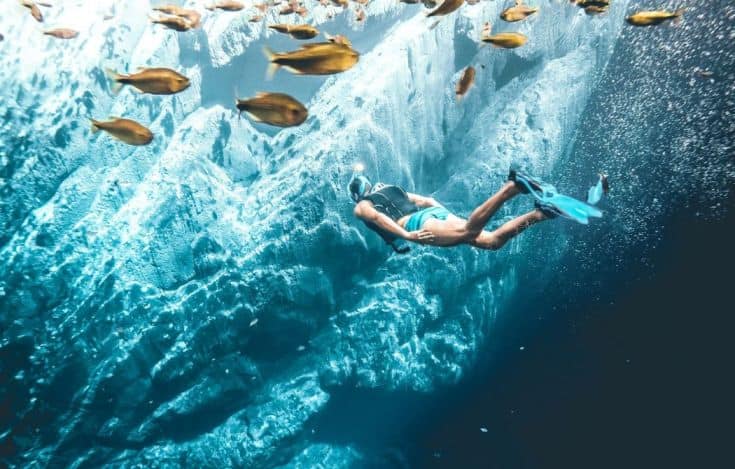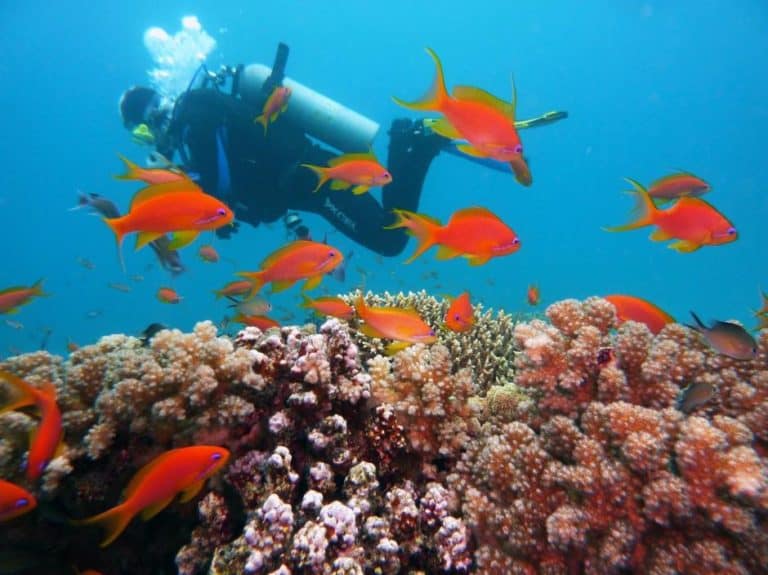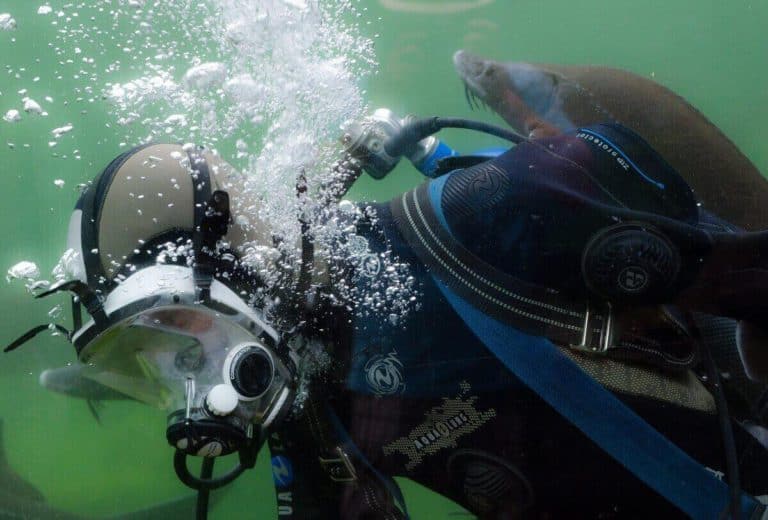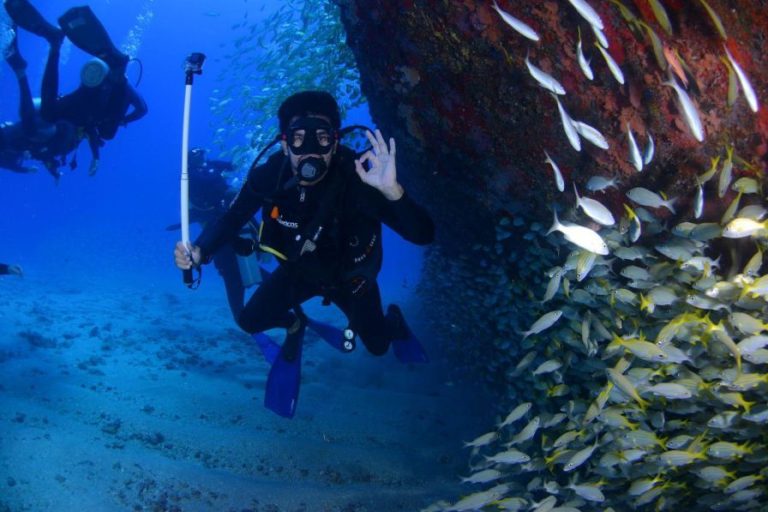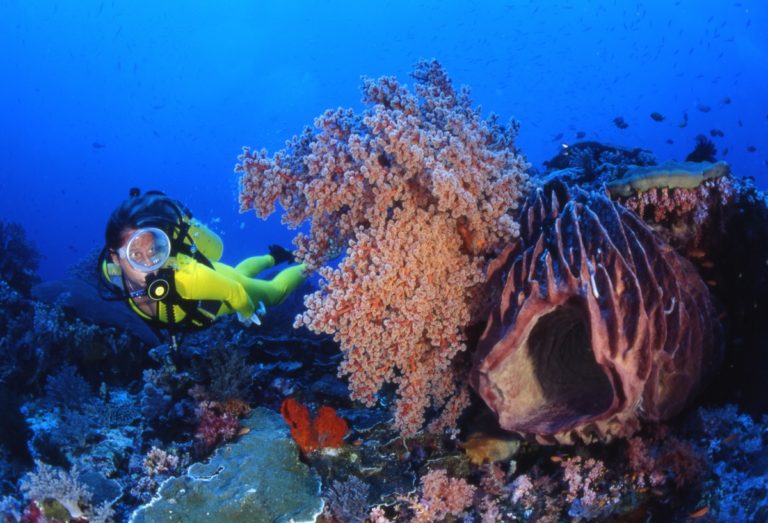What Is the Difference between Free Diving and Scuba Diving
There are many ways to explore the underwater world on the surface or deep under the surface. Snorkeling is the most preferred way to view marine life from a surface level. Freediving and scuba diving on the other hand allows you to go deeper and interact with marine life. So what is the difference between free diving and scuba diving?
The difference between free diving and scuba diving is the breathing technique used. In freediving, divers take in a single deep breath and dive into the water. On the other hand, scuba divers depend on self-contained underwater breathing apparatus(SCUBA) to help them breathe.
Freedivers dive for as long as a single breath can take them then surface for air. This could be anywhere between 2 – 9 minutes as the current world record holder (Herbert Nitsch) on the longest free dive stands at 9 minutes.
Scuba divers can stay up to 2 hours underwater, this is made possible by the air cylinders they carry during each dive.
Breathing techniques used in the two activities are the main differentiating factor. Freedivers rely on how long they can hold their breath underwater while in scuba diving divers can stay for long periods depending on the volume of their air tank.
Mastering breathing in freediving can help improve scuba diving skills. This allows divers to use oxygen efficiently an important skill especially when strong waves drift divers or any other emergencies that lead to rapid air consumption.
There are many differences and similarities between freediving and scuba diving. In this article, we’ll look into these aspects, and other tips to help you choose which one to choose or train for.
Let’s dive into it!

Similarities in Free Diving and Scuba Diving
Both activities use diving fins
Physical fitness is required in both freediving and scuba diving. Freedivers have to be in good health to hold their breath for over five minutes. The average person without any breathing training can hold their breath for 30 – 60 seconds. One requires a lot of training to hold their breath for as long as free divers do without passing out.
Scuba divers require physical fitness too. Air cylinders are quite heavy to carry around on your way to and from the diving spot. It’s also important to ensure no medical emergencies (such as a heart attack) arise while diving.
Both diving spots allow you to interact with marine life in close contact.
Both divers have to learn how to equalize the pressure exerted on the ears.
Freediving and scuba diving help build confidence underwater and in other real-life situations. Being able to stay calm while diving can extend into real-life situations and help improve your overall confidence.
Both activities can help calm you down when experiencing stressful situations in life. Water therapy benefits can be achieved while free diving or scuba diving.
Divers war weights to help offset their buoyancy when descending into the water.

Differences between Free Diving and Scuba Diving
Free Diving |
Scuba Diving |
| Divers rely on a single breathe throughout the dive | Divers rely on underwater breathing apparatus. |
| Freediving fins are extra-long and flexible | Scuba diving fins are shorter and stronger |
| Divers hold their breath while underwater | Divers should never hold their breath while underwater |
| No breathing bubbles are released allowing divers to get a closer look at marine life | Breathing bubbles escaping from the mouth scare away marine life |
| Divers can ascend quickly for air | Divers have to ascend slowly making stops to allow decompression |
| There are no rules limiting what you can or can’t do | Dives have to follow dive computers and tables for safety |
| Freediving doesn’t depend fully on gear and equipment | Divers must wear their gear and equipment each time they go diving |
| Freediving allows divers to explore both their surroundings and the inner power | Scuba diving allows divers to explore their surroundings |
| Sometimes divers free dive to see how far their body and mind can take them or withstand | Divers go on leisure dives to explore marine life and wrecks |
| In freediving, divers compete against themselves to help them push personal limits and build inner strength | There is no competition in scuba diving |
| Divers only train once for a freediving course | With each diving level, scuba divers require specialized training |
| The risk of drowning is higher while the risk of getting decompression sickness is lower | There is a higher risk of getting decompression sickness and a lower risk of drowning |
| Divers are free to move around in water making it easier to keep up with marine life | Movement is a bit restricted due to the equipment |
READ MORE: Scuba Diving or Snorkeling Which Is Better?
What Is Better Scuba Diving Or Free Diving?
Both activities have their fair share of advantages and disadvantages. Some divers participate in both which can help improve your overall diving skills and mental and physical strength.
For a first-timer, scuba diving is a safer option since the gear and equipment used help in flotation and breathing. Scuba diving is also safer for people with far of water or who can’t swim.
Freediving requires a set of skills including holding your breath for longer periods, swimming skills, and mental strength.
Someone with no prior swimming skills or breathing skills required will easily drown if they try free diving without training.
Scuba diving gear and equipment help divers go into extreme depths and explore more something that free divers don’t have. A freediver dives to the limit air in their lungs can take him or her. This shortens the exploration period as the diver has to surface for air.
Both activities are great and anyone can train for both. However, from a starting point, scuba diving is a much more reasonable option.

Do Free Divers Get The Bends?
The bends or DCS are not common in freediving. Freedivers are at a higher risk of drowning than getting DCS.
If the diver goes too deep and runs out of air while at these depths, they can easily drown.
Since free divers don’t use breathing equipment, they don’t absorb any excess nitrogen into their bodies. A freediver can safely make a quick ascent without worrying about the bends.
However, free divers taking very deep divers should do this carefully. This not only puts their brain at risk of damage, but they also are at a much higher risk of drowning or incurring other injuries.
When the brain goes for a long time without oxygen it’s likely to get damaged.
Freedivers making multiple deep dives in a short span of time can take up more nitrogen in their bodies which can result in decompression sickness.
Generally, the bends are very rare among free divers compared to scuba divers.
Parting Words
We’ve looked at the differences similarities and other factors involved in scuba and free diving. Both diving activities have pros and cons. Some people may take freediving to help improve their inner strength and power by pushing their body and mind limits. Scuba diving on the other hand can be done purely for leisure and exploration.
It’s quite common for divers to participate in both activities for various reasons. There is no harm in training and mastering both.

